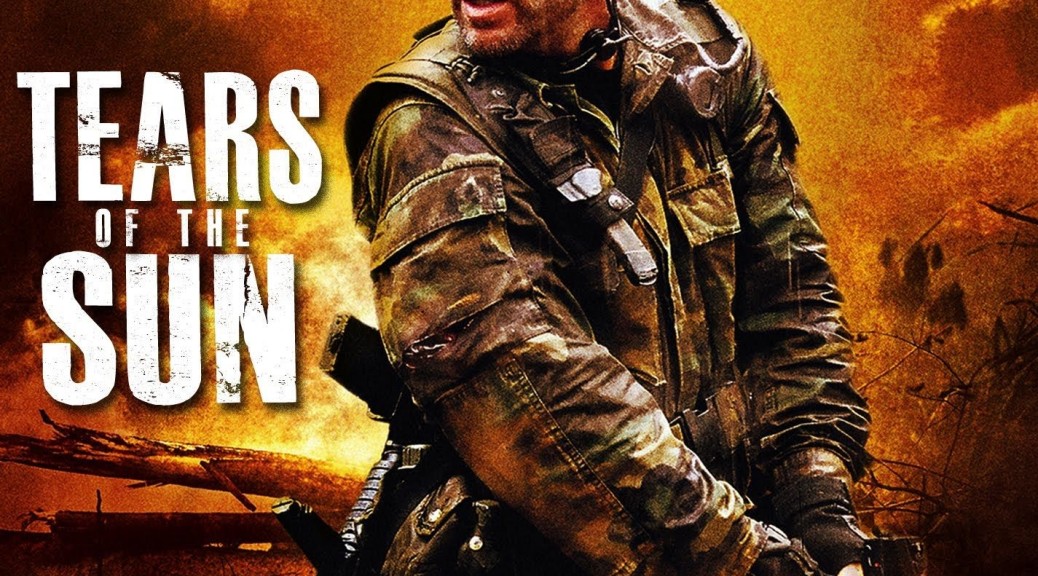Review of Tears of the Sun (2003)
Tears of the Sun relies on two major themes- narrative of a civil war and discovering individuality in epic chaos.
The opening visuals of the film startle the viewer with merciless violence in Nigeria after various ethnic groups clash for their respective agendas. Although as the film moves on, it seems the warring factions are more so divided between Muslims and Christians, at least on a broad basis.

It is a fact that high cultural and ethnic diversity carry a risk of emerging tension among groups once they become adamant to get power, or when they feel insecure about their life, culture and rights. Countries like India where scope of this diversity is humongous has been successful in keeping these groups bound into one nation through its system of democracy, re-distributive public policies and a long list of precautionary institutions. Yet such a huge, ever-green effort could not help stopping minor and major riots colored in religion every year in some part of the country, left-wing insurgents spread across hundreds of villages, separatists in Kashmir, Nagaland, Assam, Manipur and other adjoining areas in North -east India and blatantly lawless ‘show of strength’ demonstrations by regional and caste satraps. So in the absence of the buffer provided by democratic governance, good policies and institutions, it is imaginable that a country like Nigeria gets mired in civil wars and separatist movements.

The film raises the right tone for its obvious objectives of showing stark violence, brutality, coldness and fear. The death sentence seem to move around easy, quick and under open skies. Blur, fast moving shots, and dull yellow-brown tint on the screen make the situation look horrific and grim. Cold, battle-hardy faces and crying women add the contrasting flavours of death and destitution.
The pretext to this fighting is a coup by the rebel faction in Nigeria that has assassinated the President. In the aftermath the rebels are on a drive to kill the supporters of the government in general public, and specially the son of the dead President. At the same time, a group of American commandos arrive in the conflict zone to rescue an American doctor. But the dramatic lady doctor refuse to leave her native camp-mates. And after a bit more emotional theatrics, and more dramatic turn of events soldiers get to a situation where they are crossing the terrific evergreen forests on foot, leading a troupe of Nigerian refugees over to the nearby Cameroon border.

While these histrionics irritate the viewer, the tantalizing close-ups of individuals experiencing the conflict from their own positions help the film keep a grip on its audience. For me the most powerful feature of the film is its ability to highlight the grim picture of individual pain that is often whitewashed by the hyper-narrative of a war movie. What does a person, one individual and every individual thereafter, struck by a war goes through in terms of sufferings? Is there any value of a person’s death in war? What is the pain of getting maimed and having no one to attend you while the blood and life oozes out of you by its own pace? Does any documentation exists of the shock and depression on seeing your home, your things and your memories burning down? What kind of human being you are left, or what humanity is taken away from you when you are tortured, humiliated or abused by those who are adamant to show that you are weak?
The film does not answer these questions but by giving ample of space to the individual in the war it certainly provokes the viewer to think about these questions. For example one can straightaway think about what impact do the airstrikes and drone strikes leave, especially since they have become a primary way of hitting the enemy. The bombs dropped from the sky do not scan for the innocence before killing, nor are they selective in choosing the assets that are going to burn. The bombs also do not guarantee that every person in its ambit will be dead in the next moment, and no one will lie around slit open and dismembered.



In fact one of the American soldiers horrified by looking at the cruelty of rebel soldiers on their rivals, gets a revelation leading him to ponder how can they do it! His answer was actually not very far as only a few scenes prior his officer is seen telling that these rebels have captured (and now using) the weapons supplied by his own government to the regime of assassinated Nigerian President. They were the same weapons. They were supposed to garner power for their holders, eventually making them brutal. This group or that group!
Tear of the Sun is a average film that draws all its strength from the background it is based on, and the starkness of some of the scenes. I recommend you watch it once!
